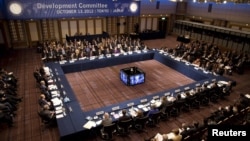TOKYO, JAPAN —
Africa, overall, is weathering the global financial crisis better than other parts of the world. While finance ministers from the continent express concern about uncertainties still ahead, they note the downturn in North America and Europe has created investment and borrowing opportunities for African nations.
Many African countries are expecting double-digit economic growth over the next five years, hoping to launch themselves into the ranks of middle-income countries, which would propel millions of people out of poverty.
Among such countries is Rwanda, which is a beneficiary of investors' growing interest in purchasing sovereign debt of African countries with positive growth.
Much of the money will be used for badly needed infrastructure projects.
Rwanda's finance minister, John Rwangombwa, dispels concern that African countries with easier access to credit will once again fall into a debt trap.
"The payback from these infrastructure projects is very high, to the extent that, apart from its financial viability, it has also this economic impact to the entire economy," he said. "So we don't see any possibility of going back into the debt trap. Our debt numbers today are very low. Today we are talking of Western countries being in 200 percent of their GDP in terms of debt stock. For example, in Rwanda we are around 22 percent. So the room is still very big.”
Namibia, with its lucrative diamond and uranium mines as well as recent outside interest in offshore oil exploration, is still experiencing growth. But since the global economic crisis began four years ago, it has exhausted its fiscal surplus.
Namibia's finance minister, Saara Kuugongelwa-Amadhila, is concerned a protracted eurozone crisis will further delay much-desired additional foreign direct investment.
“That would have a negative dampening impact on the inflows of investment. But we continue with our efforts in order to improve on the attractiveness of the country. We continue with our capital market reforms and the building of infrastructures, investment in skills provision and generally making the environment conducive for those that would want to invest in the economy,” said Kuugongela-Amadhila.
Kerfalla Yansane, the finance minister of Guinea, agrees the international economic climate has not brought in enough investment to satisfy peoples' expectations. But he notes Guinea is among developing countries enjoying more flexibility when it comes to finding partners for infrastructure projects and from which to borrow money.
Yansane says there is diversification now and no longer a need to rely exclusively on the International Monetary Fund and the World Bank. Those institutions now have competition from China, India and others.
The three African ministers are not alone in expressing the need for African nations to boost trade with each other.
One major barrier to intracontinental trade is the lack of a transportation network capable of moving large-scale shipments from one country to another, reliably and quickly. African leaders agree that an improved, integrated infrastructure would help their region become even more resilient to costly fluctuations by the global economy.
Many African countries are expecting double-digit economic growth over the next five years, hoping to launch themselves into the ranks of middle-income countries, which would propel millions of people out of poverty.
Among such countries is Rwanda, which is a beneficiary of investors' growing interest in purchasing sovereign debt of African countries with positive growth.
Much of the money will be used for badly needed infrastructure projects.
Rwanda's finance minister, John Rwangombwa, dispels concern that African countries with easier access to credit will once again fall into a debt trap.
"The payback from these infrastructure projects is very high, to the extent that, apart from its financial viability, it has also this economic impact to the entire economy," he said. "So we don't see any possibility of going back into the debt trap. Our debt numbers today are very low. Today we are talking of Western countries being in 200 percent of their GDP in terms of debt stock. For example, in Rwanda we are around 22 percent. So the room is still very big.”
Namibia, with its lucrative diamond and uranium mines as well as recent outside interest in offshore oil exploration, is still experiencing growth. But since the global economic crisis began four years ago, it has exhausted its fiscal surplus.
Namibia's finance minister, Saara Kuugongelwa-Amadhila, is concerned a protracted eurozone crisis will further delay much-desired additional foreign direct investment.
“That would have a negative dampening impact on the inflows of investment. But we continue with our efforts in order to improve on the attractiveness of the country. We continue with our capital market reforms and the building of infrastructures, investment in skills provision and generally making the environment conducive for those that would want to invest in the economy,” said Kuugongela-Amadhila.
Kerfalla Yansane, the finance minister of Guinea, agrees the international economic climate has not brought in enough investment to satisfy peoples' expectations. But he notes Guinea is among developing countries enjoying more flexibility when it comes to finding partners for infrastructure projects and from which to borrow money.
Yansane says there is diversification now and no longer a need to rely exclusively on the International Monetary Fund and the World Bank. Those institutions now have competition from China, India and others.
The three African ministers are not alone in expressing the need for African nations to boost trade with each other.
One major barrier to intracontinental trade is the lack of a transportation network capable of moving large-scale shipments from one country to another, reliably and quickly. African leaders agree that an improved, integrated infrastructure would help their region become even more resilient to costly fluctuations by the global economy.





